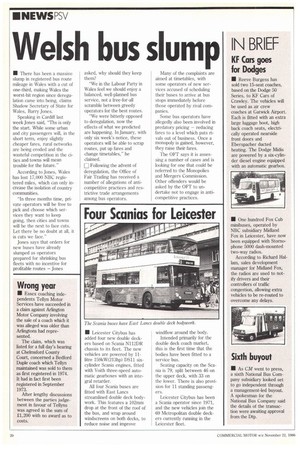Welsh bus slump
Page 22

If you've noticed an error in this article please click here to report it so we can fix it.
• There has been a massive slump in registered bus route mileage in Wales with a cut of one-third, making Wales the worst-hit region since deregulation came into being, claims Shadow Secretary of State for Wales, Barry Jones.
Speaking in Cardiff last week Jones said, "Ths is only the start. While some urban and city passengers will, in the short term, enjoy slightly cheaper fares, rural networks are being eroded and the wasteful competition in the cities and towns will mean trouble for the future."
According to Jones, Wales has lost 17,000 NBC registered miles, which can only increase the isolation of country communities.
"In three months time, private operators will be free to pick and choose which services they want to keep going, then cities and towns will be the next to face cuts_ Let there be no doubt at all, it is cuts we face."
Jones says that orders for new buses have already slumped as operators prepared for shrinking bus fleets with no incentive for profitable routes — Jones asked, why should they keep them?
"We in the Labour Party in Wales feel we should enjoy a balanced, well-planned bus service, not a free-for-all scramble between greedy operators for the best routes.
"We were bitterly opposed to deregulation, now the effects of what we predicted are happening. In January, with only six week's notice, these operators will be able to scrap routes, put up fares and change timetables," he claimed.
El Following the advent of deregulation, the Office of Fair Trading has received a number of allegations of anticompetitive practices and restrictive trade arrangements among bus operators. Many of the complaints are aimed at timetables, with some operators of new services accused of scheduling their buses to arrive at bus stops immediately before those operated by rival companies.
Some bus operators have allegedly also been involved in predatory pricing — reducing fares to a level which puts rivals out of business. Once a monopoly is gained, however, they raise their fares.
The OFT says it is assessing a number of cases and is looking for one that could be referred to the Monopolies and Mergers Commission. Other offenders would be asked by the OFT to undertake not to engage in anticompetitive practices.




















































































